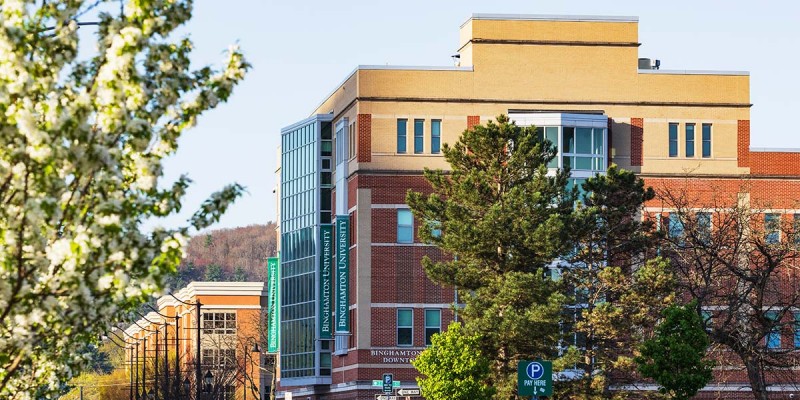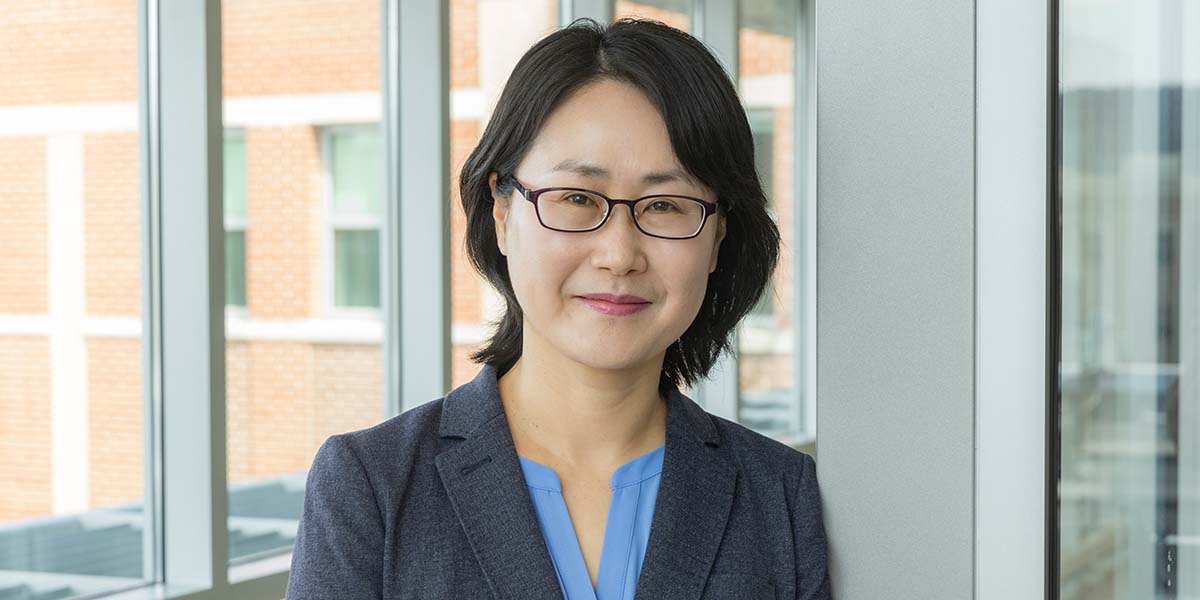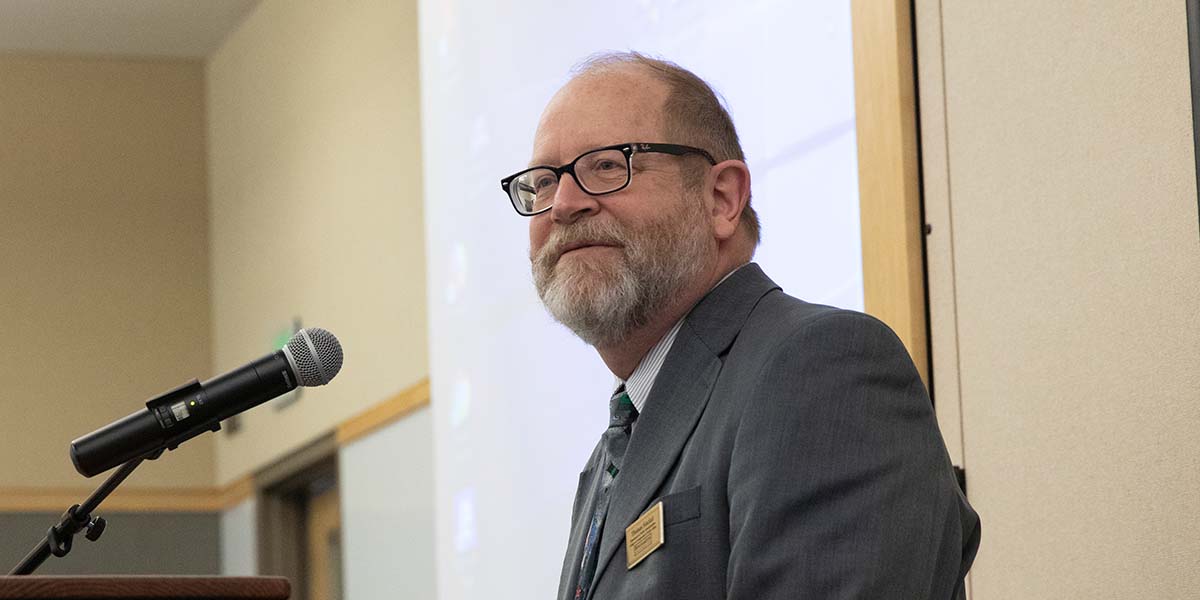How has COVID impacted public service fields? Here’s what Binghamton experts say
CCPA faculty share outlook on how pandemic changed their professions, what happens next

Scholars are still working to understand the long-term effects of the COVID-19 pandemic. Experts from the College of Community and Public Affairs (CCPA) discuss how the pandemic has changed their fields and give insight into what’s next.
Youjung Lee, chair and associate professor, Department of Social Work
Q: What challenges presented by COVID-19 are you researching?
A: Children and families in rural communities have been experi- encing long-term social isolation. While there has always been insufficient access to mental health services in these areas, it’s been made worse by the pandemic.
These challenges have become opportunities. CCPA Dean Laura Bronstein, doctoral student Kelley Cook and I, with support from a SUNY Prepare Innovation Grant, worked together to develop a telemental health service, allowing us to offer virtual mental health services for children and families, specifically in rural communities.
Q: What were the results?
A: One client told us that she felt more comfort- able receiving mental health services because it was in a virtual setting. Getting to in-person sessions would’ve been a huge barrier, and she was apprehensive about giving it a try until she learned about our free virtual service. After some sessions, she said she’s more willing to try in-person services in the future.
Q: How were telemental health services viewed before the pandemic?
A: It was always seen as secondary or optional. But now there are many researchers and prac- titioners who see that this can be an innovative way to deliver services. I believe that future social workers need to be trained in it just like they are trained for in-person practice.
Q: How would this help?
A: We’re starting to see action from government agencies to permanently eliminate geographic barriers, allowing clients at-home access to telehealth services for diagnoses, evaluation and treatment for specific health conditions.
As a result, clients who prefer multilingual support will be able to connect with providers online instead of having to physically go some- where. This will help promote equity and allow people to have access to meaningful resources.
Deborah Taub, chair and professor, Department of Student Affairs Administration
Q: What was the biggest challenge of the pandemic?
A: The field of student affairs is about bringing students together. We build community. And then suddenly, much of our job was about keeping people apart.
Q: Why is community important for college-age students?
A: It’s such a developmentally important time, and much of that development takes place within the context of community and relationships. It’s an opportunity to get to know people from different backgrounds with different viewpoints.
It’s also important for their mental health to not be isolated. As we continue creeping toward normal, we’re hearing a lot about students feeling very lonely.
Q: What will the next generation of student affairs professionals need to be successful?
A: The pandemic rocked our foundation, but it didn’t completely change it. The next generation will need to be tuned into issues related to social media and student mental health. They’ll need to be flexible and open to new ways of doing things.
Q: What has surprised you most?
A: That we’re going to be seeing the impacts of this for a while. Students didn’t just miss classroom instruction and content. They missed key developments in areas like social skills.
We’ll be working with students who will need to develop skills that we previously expected them to have already. Also, students have experienced so much loss, and they don’t know what to do with those feelings.
Q: What is the optimistic, long-term impact?
A: That we’ll see how vital student affairs work is to the overall college experience. So much learning takes place outside the classroom. I hope that the field is more humane to professionals and finds new ways for them to achieve not just a work-life balance, but also a work-life harmony.
Loretta “Lucky” Mason-Williams, associate professor, Department of Teaching, Learning and Educational Leadership (TLEL) and director, Community Research and Action PhD program
Q: How has the pandemic affected TLEL?
A: It has fortified our relationship with local school districts. We’ve been able to move our student teachers into a resi- dency program model, where our pre-service teachers work in an expanded role and help fill some workforce gaps, all while getting paid. Our districts recognize the value of putting our students into a more active role and being a part of their preparation.
Q: How will more technology in the classroom change things?
A: More teachers learned how to integrate tech platforms into their teaching, and we’re seeing them continue to find creative ways to use it. We’re past the days of computers only being used for indoor recess. For students with disabilities, teachers are increasingly using Zoom for individualized education program meetings, which increases accessibility for parents and guardians who are unable to take time off to go to the school for them.
It also has the potential to help service providers essentially be in multiple places at once to do activities like physical, occupational and speech therapy, instead of jumping around between multiple buildings.
Q: What has impressed you the most?
A: The resilience of teachers and their willingness to dig in, figure out what was needed and respond. I don’t know if we’ve rewarded them enough.
Q: What is the optimistic, long-term impact of the pandemic?
A: I think we’ll take a deep breath and recognize that schools need equitable resources. I hope we’ll recognize the value of teachers in a different way and rethink not only salaries, but the cuts that have been made to benefits and retirement and start to reinstate them.
We need more of a national approach to rewarding our teachers, because the inequities from state to state are not appropriate.
Thomas Sinclair, associate professor, Department of Public Administration
Q: How did the switch to virtual affect local governments?
A: Who ever thought that local governments could work remotely? Many found their productivity increased. City and town council meetings were held remotely, which led to more people being able to observe what was happening because they didn’t have to be physically present.
Many municipalities have posted full meeting videos online instead of just the minutes. I think it will be a tool that governments continue to use.
Q: Will this help modernize local governments?
A: It’s an interesting question. Many services they provide — zoning, planning, fire and police services, for example — aren’t going to change much. What will change is the flexibility around responding to constituent needs and demands.
The contact between people and government is going to be more flexible, more 24/7, and not limited and tied to a specific time and office location.
Q: How did the federal response help?
A: The federal financial response made a huge difference. It covered a broad umbrella of things governments could do, from increasing pay for essential workers to investing in water and sewage infrastructure. It helped protect and buffer them from the loss of sales tax revenues.
Q: What governments fared the best?
A: Governments that have strong networks do better at managing crises. Those that have close ties with their local United Way or nonprofit organizations can tap into those relationships to help solve large problems. We find this to be true in natural disaster responses, and it’s been consistent through COVID.
Q: What skills will the public administrators of the future need to be successful?
A: Communication, flexibility and the ability to make decisions with limited or ambiguous information.




